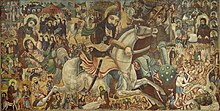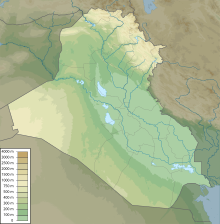
Back የካርባላ ጦርነት Amharic معركة كربلاء Arabic معركة كربلاء ARZ কাৰবালাৰ যুদ্ধ Assamese Kərbəla döyüşü Azerbaijani کربلا دؤیوشو AZB Битка при Кербала Bulgarian কারবালার যুদ্ধ Bengali/Bangla Bitka na Kerbeli BS Batalla de Karbala Catalan
| Battle of Karbala | |||||||
|---|---|---|---|---|---|---|---|
| Part of the Second Fitna | |||||||
 Abbas Al-Musavi's Battle of Karbala, Brooklyn Museum | |||||||
| |||||||
| Belligerents | |||||||
| Umayyad Caliphate | Husayn ibn Ali and his partisans | ||||||
| Commanders and leaders | |||||||
|
Ubayd Allah ibn Ziyad Umar ibn Sa'd Shimr ibn Dhi al-Jawshan Al-Hurr ibn Yazid al Tamimi (defected) |
Husayn ibn Ali † Al-Abbas ibn Ali † Habib ibn Muzahir † Zuhayr ibn Qayn † | ||||||
| Strength | |||||||
| 4,000–5,000[1][2][3][4][5][a] | 70–145 | ||||||
| Casualties and losses | |||||||
| 88 | more than 72 | ||||||
Location within Iraq | |||||||
| Part of a series on Shia Islam |
|---|
 |
|
|
| Part of a series on |
| Husayn |
|---|
The Battle of Karbala (Arabic: مَعْرَكَة كَرْبَلَاء, romanized: maʿraka Karbalāʾ) was fought on 10 October 680 (10 Muharram in the year 61 AH of the Islamic calendar) between the army of the second Umayyad caliph Yazid I (r. 680–683) and a small army led by Husayn ibn Ali, the grandson of the Islamic prophet Muhammad, at Karbala, Sawad (modern-day southern Iraq).
Prior to his death, the Umayyad caliph Mu'awiya I (r. 661–680) had nominated his son Yazid as his successor. Yazid's nomination was contested by the sons of a few prominent companions of Muhammad, including Husayn, son of the fourth caliph Ali, and Abd Allah ibn al-Zubayr, son of Zubayr ibn al-Awwam. Upon Mu'awiya's death in 680, Yazid demanded allegiance from Husayn and other dissidents. Husayn did not give allegiance and traveled to Mecca. The people of Kufa, an Iraqi garrison town and the center of Ali's caliphate, were averse to the Syria-based Umayyad caliphs and had a long-standing attachment to the house of Ali. They proposed Husayn overthrow the Umayyads. On Husayn's way to Kufa with a retinue of about 70 men, his caravan was intercepted by a 1,000-strong army of the caliph at some distance from Kufa. He was forced to head north and encamp in the plain of Karbala on 2 October, where a larger Umayyad army of 4,000[a] arrived soon afterwards. Negotiations failed after the Umayyad governor Ubayd Allah ibn Ziyad refused Husayn safe passage without submitting to his authority, a condition declined by Husayn. Battle ensued on 10 October during which Husayn was killed along with most of his relatives and companions, while his surviving family members were taken prisoner. The battle was the start of the Second Fitna, during which the Iraqis organized two separate campaigns to avenge the death of Husayn; the first one by the Tawwabin and the other one by Mukhtar al-Thaqafi and his supporters.
The Battle of Karbala galvanized the development of the pro-Alid[b] party (Shi'at Ali) into a distinct religious sect with its own rituals and collective memory. It has a central place in Shi'a history, tradition, and theology, and has frequently been recounted in Shi'a literature. For the Shi'a, Husayn's suffering and death became a symbol of sacrifice in the struggle for right against wrong, and for justice and truth against injustice and falsehood. It also provides the members of the Shi'a faith with a catalog of heroic norms. The battle is commemorated during an annual ten-day period during the Islamic month of Muharram by Shi'a, culminating on tenth day of the month, known as the Day of Ashura. On this day, Shi'a Muslims mourn, hold public processions, organize religious gathering, beat their chests and in some cases self-flagellate. Sunni Muslims likewise regard the incident as a historical tragedy; Husayn and his companions are widely regarded as martyrs by both Sunni and Shi'a Muslims.
- ^ Wellhausen 1901, p. 65.
- ^ Vaglieri 1971, p. 609.
- ^ Madelung 2004, pp. 493–498.
- ^ Ayoub 1978, p. 109.
- ^ Halm 1997, p. 9.
- ^ Munson 1988, p. 23.
- ^ Donner 2010, p. 178.
- ^ Kennedy 2004, p. 89.
Cite error: There are <ref group=lower-alpha> tags or {{efn}} templates on this page, but the references will not show without a {{reflist|group=lower-alpha}} template or {{notelist}} template (see the help page).
